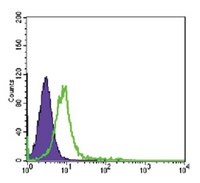MABN694 Sigma-AldrichAnti-CHD3 Antibody, clone 2G4
Detect CHD-3 using this mouse monoclonal antibody, Anti-CHD3 Antibody, clone 2G4 validated for use in western blotting, IHC, Immunofluorescence & Flow Cytometry.
More>> Detect CHD-3 using this mouse monoclonal antibody, Anti-CHD3 Antibody, clone 2G4 validated for use in western blotting, IHC, Immunofluorescence & Flow Cytometry. Less<<Anti-CHD3 Antibody, clone 2G4 MSDS (material safety data sheet) or SDS, CoA and CoQ, dossiers, brochures and other available documents.
Recommended Products
概述
| Replacement Information |
|---|
重要规格表
| Species Reactivity | Key Applications | Host | Format | Antibody Type |
|---|---|---|---|---|
| H, M | WB, IHC, IF, FC | M | Ascites | Monoclonal Antibody |
| References |
|---|
| Product Information | |
|---|---|
| Format | Ascites |
| Control |
|
| Presentation | Mouse monoclonal IgG1 ascitic fluid containing up to 0.1% sodium azide. |
| Quality Level | MQ100 |
| Physicochemical Information |
|---|
| Dimensions |
|---|
| Materials Information |
|---|
| Toxicological Information |
|---|
| Safety Information according to GHS |
|---|
| Safety Information |
|---|
| Packaging Information | |
|---|---|
| Material Size | 100 µL |
| Transport Information |
|---|
| Supplemental Information |
|---|
| Specifications |
|---|
| Global Trade Item Number | |
|---|---|
| 产品目录编号 | GTIN |
| MABN694 | 04053252920745 |
Documentation
Anti-CHD3 Antibody, clone 2G4 MSDS
| 职位 |
|---|
Anti-CHD3 Antibody, clone 2G4 分析证书
| 标题 | 批号 |
|---|---|
| Anti-CHD3, clone 2G4 - QVP1306172 | QVP1306172 |
| Anti-CHD3, clone 2G4 -VP1501024 | VP1501024 |
| Anti-CHD3, clone 2G4 -VP1503139 | VP1503139 |










